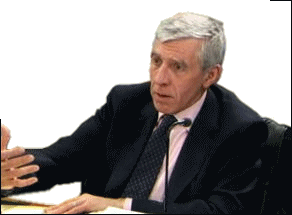Usually a straw man argument is a filtered, simplified story created to make the it look foolish. In this case, that’s not what Jack Straw is trying to do, but he succeeds anyway. He creates a story that looks quite foolish, only he’s passing it off as the truth.
 Jack Straw, the Foreign Secretary in 2003, wore a pink shirt to his second [called] interview. That shirt makes a statement about Jack Straw that carries into his testimony. He’s a charismatic, smart man – something of a ‘slick willie’ with little humility. In a contentious exchange, Baroness Usha Prashar and the Foreign Secretary, Jack Straw, argued about Sir Michael Wood’s testimony. The issue is that Wood, Straw’s legal adviser, wrote a note to Straw saying that a second resolution from the UN would be required for the War to be lawful. Straw questioned his conclusions.
Jack Straw, the Foreign Secretary in 2003, wore a pink shirt to his second [called] interview. That shirt makes a statement about Jack Straw that carries into his testimony. He’s a charismatic, smart man – something of a ‘slick willie’ with little humility. In a contentious exchange, Baroness Usha Prashar and the Foreign Secretary, Jack Straw, argued about Sir Michael Wood’s testimony. The issue is that Wood, Straw’s legal adviser, wrote a note to Straw saying that a second resolution from the UN would be required for the War to be lawful. Straw questioned his conclusions.  Later, when it became clear that there would be no second resolution passed, Straw instructed Sir Michael Wood to write a balanced memo to the Attorney General [who was to make the final decision] – laying out both arguments. Now he’s saying that what Wood said in the second paper [the ‘balanced’ one], was actually Sir Michael Wood’s view [a memo Straw directed him to write]. My aside: In this case, he says that the fact that he [Straw] directed the type of Memo Wood should write didn’t matter. Straw said if it weren’t his opinion, Sir Michael Wood shouldn’t have written it. In other words, the "directive" or "negotiation" didn’t matter. Yet, Straw was the main person pushing the idea that the "negotiation history" should be considered in interpreting UNSCR 1441. Lord Goldsmith apparently bought Straw’s idea in his decision that the "war was legal." Baroness Prashar was having none of his assertion. I am having none of it either…
Later, when it became clear that there would be no second resolution passed, Straw instructed Sir Michael Wood to write a balanced memo to the Attorney General [who was to make the final decision] – laying out both arguments. Now he’s saying that what Wood said in the second paper [the ‘balanced’ one], was actually Sir Michael Wood’s view [a memo Straw directed him to write]. My aside: In this case, he says that the fact that he [Straw] directed the type of Memo Wood should write didn’t matter. Straw said if it weren’t his opinion, Sir Michael Wood shouldn’t have written it. In other words, the "directive" or "negotiation" didn’t matter. Yet, Straw was the main person pushing the idea that the "negotiation history" should be considered in interpreting UNSCR 1441. Lord Goldsmith apparently bought Straw’s idea in his decision that the "war was legal." Baroness Prashar was having none of his assertion. I am having none of it either… To be sure, Straw is in a spot in that hindsight is 20/20 – and this war sucked. But he, like Tony Blair, essentially thinks he did no wrong – ever. Also, like Blair, he never engages the actual point of the specific inquiry – which was that Blair and Straw were pushing for war. Their every action aimed in that direction. They handed Lord Goldsmith the task of making a legal decision making it extremely clear what they wanted him to decide. They both try to explain their actions as straight up. That’s obviously not true. The British were not so flippant as Bush and Cheney in getting the legal advice they wanted [from John Yoo], but, they did work at getting the decision they wanted.
No matter what they say, they tried to get a second resolution from the UN and gave up because it would have been vetoed. The UN itself obviously thought that the use of force was not yet justified. I don’t think Straw ever answers the question ‘why didn’t they wait?’ I’m not sure he was ever asked directly. Throughout the questioning, however, Jack Straw implicitly would not own up to the fact that he was pushing for the use of force. There came a point when Straw was discussing the negotiating history when he said:
There has to be a reason, Sir Lawrence, why these negotiations began in late September and went on intensively, night and day, for six weeks, and the reason was that, because of the American’s, so called, red line, and indeed our own, that we believed that Saddam had had enough final opportunities to be given just one more. If we had gone for a resolution which required a second resolution, required a second resolution, we would not have been giving him a final opportunity. We would have been giving him two final opportunities and the whole exercise would have degraded. I really would urge Sir John and the Inquiry to take on board the difference between seeking a resolution which required a second resolution and seeking a resolution that, as it – which did not –
-
All of this discussion is about Saddam Hussein’s and Iraq’s compliance with the UN Sanctions and Resolutions. In the US, we were never told that we were invading Iraq because of Hussein’s dealings with the UN. We were told we were invading Hussein’s Iraq because we had evidence that he had weapons of mass destruction and that our national security was in peril. The legality from the British point of view may have rested on UNSCR 1441, but we had thrown legality to the wind [or to John Yoo].
-
Was there anything that happened after UNSCR 1441 was passed that may have given the members of the UN Security Council a reason to be less interested in approving the use of force? Yes! Colin Powell presented our case for war and our evidence for WMD’s in Iraq to the UN. Any fool watching Powell’s presentation would have smelled a rat. We didn’t have any evidence for our assertions that was close to solid. We gave figures for his supposed stockpiles that were, at best, bad guesses based on assumptions that were patently absurd. Things like "assuming his plants functioned at 100% efficiency ten years ago…" minus "what was found by inspectors nine years ago." What malarkey. The UN had every reason in the world to be more cautious…
-
Neither the UN nor the UK agreed with the "regime change" idea, at least not in public. But from the first shot, that was clearly the aim of the invasion, including issuing a hit list [the famous deck of cards]. Our first bombs were aimed at Saddam’s Palace – the one we thought he was in at the time. We weren’t in Iraq to enforce UN sanctions. We were there to kill Hussein, his sons, and annihilate his government – something we did in short order. Today, Jack Straw said that there was never a goal of "regime change."The last thing I would say is this: the purpose of the action was not regime change. I had hoped that we would resolve it peacefully and we would just have to manage Saddam after that but he would have been disabled. But that having happened, I think there are few in Iraq, despite the bloodshed, would now say that they want to go back to what existed before 20 March 2003.Bullshit, Jack!
Sorry, the comment form is closed at this time.